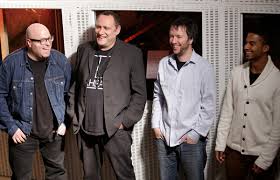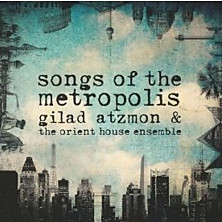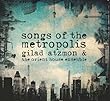
I am on the front cover of Jazz Journal this month. A very interesting interview. We discussed art, politics, the state of Jazz and the destructive role of art funding. We spoke about the band, the political pressure and about life in general. A very interesting piece
Jazz Journal, February 2013. www.jazzjournal.co.uk
----------------------------------------------------------------------------------------------------
‘When politicians get involved and decide who will get the money, who should be part of the discourse, we make everything conscious. We are basically killing the existential, libidinal spontaneity of this art form’
---------------------------------------------------------------------------------------------------
Gilad Atzmon: Musical capital
by Mark Gilbert
The Israeli-born, UK-resident reedman, composer and writer talks to MARK GILBERT in advance of five solid months on the road to coincide with the release of Songs Of The Metropolis
Gilad Atzmon’s spring UK tour, partially listed in JJ last month, is impressively larger (now around 40 dates) than any tour by his peers in recent memory. How does he get so many gigs, never mind the subsequent appearances in Japan, Argentina, Europe and the USA that take him away from home until mid-June? The Israeli-born, UK-resident reedman who says “I am upset by Israel, by Jewish politics” is known for a certain political notoriety – an often valuable currency in the modern jazz world – and one of my key questions for him is to what extent he has exploited that notoriety to further his musical career.
“My views are read by millions every day [at www.gilad.co.uk], which means it is possible that my audience is bigger than many jazz artists. But if anything my views damage my career. I’ve seen one of the biggest Jewish lobbies in the world putting pressure on the Arts Council to cancel my appearance in festivals that are funded by the Arts Council. I must say about the Arts Council, they really stood for me. They said that they were very proud to give stage to Gilad Atzmon.”
 The Arts Council is not alone. Ian Storror, booker at the Bristol venue he appeared at in late January says: “A Gilad performance is always a tour de force. He will have you laughing out loud one minute and in tears or thumping your fist the next . . . never dull. The musicianship is beyond doubt . . . a ‘not to be missed’ gig on any music calendar.”
The Arts Council is not alone. Ian Storror, booker at the Bristol venue he appeared at in late January says: “A Gilad performance is always a tour de force. He will have you laughing out loud one minute and in tears or thumping your fist the next . . . never dull. The musicianship is beyond doubt . . . a ‘not to be missed’ gig on any music calendar.”
As Atzmon’s numerous CD releases attest, there is a strikingly competent and creative musician behind the horns, typically these days the soprano saxophone and clarinet. Both instruments are prominent on Songs Of The Metropolis, the latest CD from Atzmon and his Orient House Ensemble. Gig promoters might just have a vested interest, but no less an arbiter than Robert Wyatt also endorses Atzmon’s musicianship, writing that he is “The best musician living in the world today.”
At risk of biting the hand that feeds, Atzmon is sceptical about the British arts system, about the addition of form-filling to the musician’s skill-set, and it bears on his musical philosophy in general. For all his political sensibility and evident intellectual capacity (his website bears witness to the volume of writing he has done on musical and nonmusical matters), Atzmon holds that jazz at its best is a instinctive activity, one that is in perpetual danger of having its vital power drained by subsidising bodies propelled by an “Enlightenment” view of music.
“What I am saying is not against the Arts Council – I think they are doing a lot of great stuff –but I believe that the existence of an artist should be inherently dependent on the ability to communicate with an audience – I don’t say big audience. The art form that I am involved with is basically the total opposition to the Enlightenment. The Enlightenment is there to praise the thinking human subject. But when it comes to art, the best of it is actually produced when you are totally unconscious.
“This is why the best art – the best jazz – was produced when Coltrane and Bird were making heavy use of narcotic elements. Jazz is a suicidal art form. You sacrifice your livelihood for the sake of music. When politicians get involved and decide who will get the money, who should be part of the discourse, we make everything conscious. We are basically killing the existential, libidinal spontaneity of this art form.”
Although public subsidy trickles down to the benefit of just about everyone involved in producing or consuming (or commenting on) the arts, Atzmon’s tour is all his own work except for the help of a couple of agents. It seems of a piece with the dynamic, visceral outlook of this self-made man-musician.
* * * * * *
THE ENTREPRENEURIAL instinct goes back to the beginning. He didn’t play the saxophone, or jazz, until he was 17, and must have worked hard to achieve the technique and musical awareness he typically shows today as conceptualist, composer and soloist. Try, for example, the series of powerfully logical climaxes he creates towards the close of his solo on Tel Aviv on the new album, or the intensity of Buenos Aires at around 6:40. Notice, in addition, the admixture of harmonic movement in pieces that sound deceptively modal.
Lest anybody should suspect there isn’t a lot of jazz here, Atzmon has paid his Real Book dues. He points out that Songs Of The Metropolis is different from his previous output because it moves away from the “D minor, Coltranesque” thing that exemplified such earlier albums as Exile – “except maybe,” he says, “in Scarborough Fair”.
“I really love harmony but we never managed to integrate harmony into the Arabic music we did. It just doesn’t work. I wanted to go somewhere else and this is where I ended up. Paris is written like a standard. Buenos Aires is like a standard. When you look at the page it looks like a jazz tune.”
The jazz wood-shedding happened early, and its fruits were clearly evident in Atzmon’s first UK album, Take It Or Leave It... (1997, Face Jazz). It’s a brave debut with just bass and drums on which he brings a distinctive orientalism to his inflections and phrasing on In A Sentimental Mood and a fresh rhythmic dynamism to Doxy. Rollins would no doubt approve of his ability to let the music breathe. Atzmon’s muscular technique is always at the service of a provocative and witty musical imagination – the sound of surprise even in these late days for the standard repertoire. Where is this tune going to go next?
Jewish identity pokes its head in again as we trace his musical roots. Discovering Charlie Parker in Jerusalem as a teenager was a revelation, and an escape: “You know why we play jazz? Because we want to run away from our Jewish mothers. I was a Jew in Israel. Had to go to the army to die in this idiotic thing. And suddenly I listen to John Coltrane and Charlie Parker and I became a free human being.”
He had no formal musical training and to this day doubts the value of jazz education, citing the ennervating effect of analysis on feeling. “All those jazz schools are there to transform spirit into knowledge. And for me jazz is the complete opposite. What makes jazz horrid and unlistenable is the conscious attempt to make it sound clever. If you want to play music, make me cry. Listen to Coltrane’s ballads, listen to Bird with strings, listen to Alabama, not to these new jazzers who try to play in rhythm signatures you know they don’t feel or understand.”
The drive to genuine, individualised, protestant (small p) feeling seems at the base of all Atzmon does. On the 2003 Exile album the stunning voice of Reem Kelani on Dal’ouna On The Return has all the individualised inflection and passion a jazz fan could wish for. Now the Orient House Ensemble relies mostly on instruments for the same communicative power. Atzmon gets this partly through following the lesson of his musical “gods”, among which are Michael Brecker, Dave Liebman and Steve Grossman, players who have spent a lifetime dealing with the unforgiving realities of standing out in the cut and thrust of New York City. They aren’t, shall we say, “enlightened” Europeans but musicians driven to a certain directness by the imperative to communicate quickly and widely. “You listen to Parker, Coltrane, Brecker – there is simplicity there but not because it is simple.”
The same urgency and clarity of expression can be heard in Atzmon’s playing, and the new record is conceptually a step along the same road. He says it’s a kind of protest (another – “I must always protest against something”) against the mush of cultural homogeneity, the “globalised flood”. It attempts to create clear if nostalgic portraits of once more distinctly differentiated locations. I tell him that Liebman once told me that jazz was now an international music. “Yes,” he says – “nobody cares about it anywhere!” One senses that Atzmon may change that attitude at venues across the globe in the coming months.
 Songs Of The Metropolis
Songs Of The Metropolis









